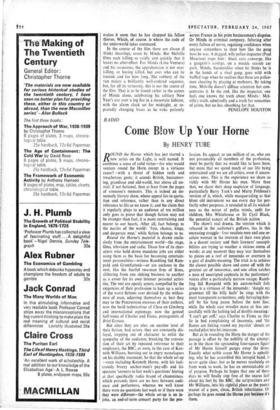Come Blow Up Your Horne
RADIO
By HENRY TUBE
R0 UND the Horne, which has just started a new series on the Light, is well named. It combines a sense of solid virtue—for who would venture round the Horn except in a virtuous cause?—with a threat of hidden reefs and treacherous gusts; it sounds British, buccaneer- ing, grandiose and old-world, but above all un- real; if not fictional, then at least from the pages of someone's memoirs. This is indeed an im- mensely literary show, whose appeal lies in quota- tion and reference, rather than in any direct relevance to life as we know it; and the claim that it regularly plays to an audience of ten million only goes to prove that though fiction may not be stranger than fact, it is more entertaining and nearer to our hearts. After all, fact belongs to the nasties of the world : 'fate, chance, kings, and desperate men,' while fiction belongs to us.
Round the Horne's material is drawn exclu- sively from the entertainment world—the stage, films, television and radio. Those few of its char- acters who hold down mundane jobs are either using them as the basis for becoming entertain- ment personalities—witness Rambling Sid Rum- pold and Gruntfuttock—or are cuckoos in the nest, like the fearful two-man firm of Bona, slithering from one sinking business to another as a cover for its own intenser personal activi- ties. The rest are openly actors, compelled by the exigencies of their profession to ham up a series of the worst fictions ever devised by the witless- ness of man, adjusting themselves as best they may to the Procrustean excesses of their authors, now the lurid technicolour of Chou en Ginsberg and international espionage, now the genteel half-tones of Charles and Fiona, protagonists of Brief Ecstasy.
But since they are also, on another level of their fiction, bad actors, they are constantly dis- loyal, stepping out of character to enlist the sympathy of the audience, breaking the conven- tion of their art by repeated reference to their employers, the BBC, or even, in the case of Ken- neth Williams, bursting out in angry monologues on his shabby treatment. So that the whole set-up —even including Kenneth Horne, with his ludi- crously breezy anchor-man's pay-offs and his spurious 'answers to last week's questions' hinting at that specifically radio brand of chumminess which pretends there are no bars between audi- ence and performers, whereas we well know there were no questions last week or if there were they were different—the whole set-up is an in- joke, an end-of-term concert party for the pro- fession. Its appeal, to ten million of us, who are not presumably all members of the profession, must be partly that we would like to have been, but more that we spend much of our life being entertained and we are all critics, even if uncon- scious ones. This is the experience we share so richly with Mr Horne his men. More than that, we share their deep suspicion of language, particularly Barry Took's and Marty Feldman's version of it, which, while masquerading as that blunt old instrument we use every day for per- fectly sober purposes, is revealed in all its wicked- ness as the terror of polite minds, unfit for children, Mrs Whitehouse or Sir Cyril Black, the potential cancer of the British nation.
The show's real drama, the tension which is released in the audience's guffaws, lies in this unceasing struggle: four resolute men and one re- solute woman in the interests of their own place in a decent society and their listeners' suscepti- bilities are trying to weather a vicious storm of words; at any moment they may tear themselves to pieces on a reef of innuendo or overturn in a gust of double-meaning. The trick is to achieve the closest possible shave and come off with the greatest air of innocence, and one often catches a note of unscripted euphoria in the performers' voices after a particularly narrow escape. Ramb- ling Sid Rumpold with his custom-built folk songs is a virtuoso of the innuendo: 'dangle my grummet till the billy boils' he sings with the most transparent earnestness, only betraying him- self by his long pause before the next line; while the whole cast wrestles more or less suc- cessfully with the lashing tail of double meaning: `I can't get orff,' says Charles to Fiona as they lie in bed complaining of insomnia, and 'the flames are licking round my joystick' shouts an excited pilot into his intercom.
But as in rounding the Horn the danger of the passage is offset by the nobility of the attempt, so in the show the upstanding four-square figure of Mr Horne himself purges away the dross. Exactly what noble cause Mr Horne is uphold- ing, why he has assembled this intrepid band, is never quite clear, but as he moves resolutely on from week to week, he has an unmistakable air of purpose. Perhaps he hopes that one of these days he will finally step free of the snares laid about his feet by the BBC, the scriptwriters and Mr Williams, into his rightful place as the young master of a pure, clean, British inheritance. Or perhaps he goes round the Horne just because it's there.






























 Previous page
Previous page